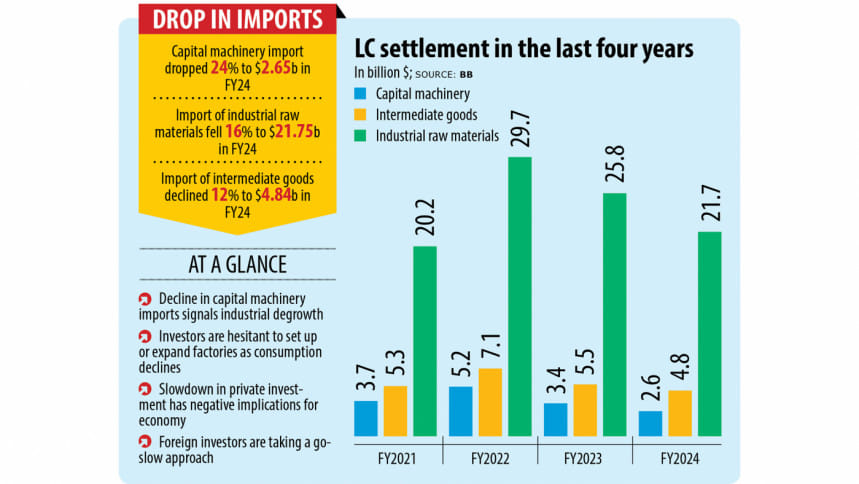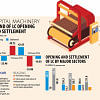Key imports fall, painting bleak outlook for investment, jobs

Bangladesh's imports of capital machinery, industrial raw materials, and intermediate goods fell for a second consecutive fiscal year, reflecting the depressed state of private investment and bleak prospects for new jobs.
Data from the Bangladesh Bank on the settlement of letters of credit (LCs) shows that imports of capital machinery, a key indicator of investment, dipped 24 percent year-on-year to $2.66 billion in FY24, which ended in June.
In the preceding fiscal year, capital machinery imports plunged by 34 percent.
The decline is a consequence of persistent US dollar shortages and increased import costs due to the devaluation of the local currency.
"The decline in imports of capital machinery shows a clear path of degrowth in investment in the industrial sector, which will adversely affect employment generation," said Khondaker Golam Moazzem, research director at the Centre for Policy Dialogue (CPD).
The data shows that investors are not interested in financing new industries or expanding existing manufacturing units, he said.
Data from the central bank also showed that imports of industrial raw materials went down 16 percent year-on-year to $21.75 billion in FY24 due to falling exports and slowing domestic demand in the face of spiralling inflation.
The value of imported industrial raw materials dropped by 13 percent in the preceding fiscal year.
Moazzem added that global demand for products exported by Bangladesh has fallen. At the same time, domestic demand has declined significantly, which is why investors do not want to take risks.
"So, the contribution of the industrial sector to the country's gross domestic product (GDP) will decline for a long time," he said.
The country's economy has endured a few difficult years recently due to numerous challenges, he said.
For example, forex reserves shrank from $41.7 billion in August 2021 to $20.41 billion on July 31 this year, central bank data showed.
Due to the distressed scenario of foreign exchange reserves, foreign investors are adopting a go-slow strategy, he said.
Moazzem further said small-and-medium entrepreneurs (SMEs) would face severe challenges.
Selim Raihan, executive director of the South Asian Network on Economic Modeling (Sanem), said the reduction in capital machinery imports occurred as import restrictions were put in place due to the scarcity of the greenback. He attributed increases in the price of US dollars as another reason.
"It reflects how much private investment declined during the past two years," he said, adding that there was a negative impact on private sector investment while private sector credit growth slowed significantly.
The decline in imports of capital machinery shows a clear path of degrowth in investment in industrial sector, said an economist
Raihan cautioned that another implication of falling capital machinery imports would be a slowdown in economic growth in the coming days.
"Investment will slow and that will impact the job market as employment generation will be reduced," he added.
"We need time-befitting policy decisions, including exchange rate policies, to improve the situation," he suggested. Necessary measures to boost exports and remittances should also be taken to reduce the pressure of the dollar crisis.
"Simultaneously, we need to investigate whether money was laundered through over-invoicing and take initiatives to bring back that money," Raihan said.
The government should rethink import restrictions and monitor exports and imports to avoid over and under invoicing.
M Masrur Reaz, chairman of the Policy Exchange of Bangladesh, said the drop in capital machinery imports was a real concern for industrial production and its contribution to the economy.
Industrial output will be reduced immediately, and export capacity will not improve, he said.
At the same time, economic output will be reduced and capital will not be created.
Reaz also said there is a possibility of job cuts alongside reduced employment generation.

 For all latest news, follow The Daily Star's Google News channel.
For all latest news, follow The Daily Star's Google News channel. 








Comments